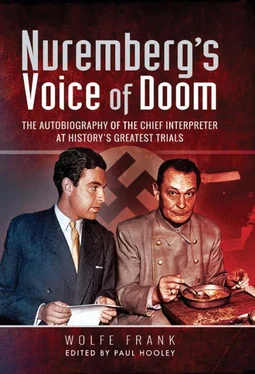Because of our long, gentle courtship, we were mentally and emotionally completely adjusted to each other and it was no wonder, then, that our lovemaking was of immediate perfection. Neither of us, so we discovered, had known love like this before and it is only through intensive auto-suggestion that I have persuaded myself that some moments, afterwards, have ever been as good.

15. THE JOLLY BOATMAN
MOST OF THE FRIENDS PAT AND I HAD during this period were involved in the theatre and included stars and starving kids alike. We saw all the shows, went to all the clubs and we ate, it seems, in all the restaurants in the West End.
The sandpit was paying me a reasonable salary, the Canaveral project contributed a little more. Also, Humphrey had acquired a small furniture factory in the East End of London that he christened the Cygnet Furniture Company – because the Sykes’ family crest included such a bird. The managing director left when Humphrey bought out the owner.
I know not why Sykes wanted to make furniture, nevertheless he appointed me managing director of this company also. The sales manager was an unforgettable cockney character, Dennis Blakely, who was completely bald at the age of twenty-six and he wore a red wig that must have come from Woolworths. He frequently found the wig bothersome and shoved it to the back of his head like a gangster would wear a hat in a bad movie.
I moved from Earls Court to Dolphin Square, [1] Dolphin Square is a block of luxury flats, favoured by members of both Houses of Parliament and the Gentry, which were built between 1935-1937 near the River Thames in Pimlico.
a new and well-conceived block of flats in Westminster. I furnished my new abode with Cygnet’s best furniture and used it as a showroom. It was this flat that I lent to my old friend Alice Goldstern when she fled from Munich. Tragically she was killed there during a German air raid on London.
Dolphin Square had one of the finest sports centres I had seen. So, every morning at a quarter to eight I would take the lift down and do twenty minutes of exercises in the gymnasium, followed by half-an-hour’s squash and a swim. This I did no matter how late or how drunk I had gone to bed. By the time I hit the pool I was sober and any hangover had gone. Pat and I would then eat a huge breakfast and I would be in my office by 10.00 hours – which was quite early enough for London.
Much to my regret, Pat and I never managed to live together. She had a pretty autocratic mother, a retired singing teacher, and a nosy brother whom I got off our backs by employing him at Cygnet as a salesman.
Mum however had to be lied to when her darling daughter wanted to stay away for the night, and we came up with some priceless stories. Strangely enough, mother Leonard never objected when we went on holiday together, but the odd night in London had to be camouflaged.
By this time, I owned a boat that, after renovation work, Pat and I set sail in, or rather cranked up the engine of, for the first time at Easter 1938. As Pat was unpacking crockery below deck, I approached my first Thames river lock, near Maidenhead. I had never driven a boat before and put it into reverse far too late. I hit the far gate of the lock, which was of course closed, with a tremendous wallop and the tinkling of breaking china and glass from below deck went on for an unreasonably long period – rather like a sound effect on a radio comedy show.
Twenty-four years later I entered Boulters Lock again, this time with a chartered cruiser. The lockkeeper stared at me, then walked off to operate the gates. He came back, stared some more, scratched his head and said: ‘Wuurrent you the Gentleman who troyed to knock me gate down a while back?’ ‘I wurr,’ I replied. Clearly an impression made with a bang appears to be a lasting one – Confucius, he say.
We made some lovely trips on that old boat. It slept four and we had the most enjoyable company. One particularly memorable excursion took us down the Kennet-Avon Canal from Reading to Bristol. The canal, though no longer used by freight barges, had to be kept in navigable condition because of an ancient piece of legislation.
There were four of us aboard, Pat and I plus Hugo Rignold, [2] Hugo Henry Rignold (1905–1976) was an English conductor and violinist, who is best remembered as having been Musical Director of the Royal Ballet and conductor of the City of Birmingham Symphony Orchestra.
who was the then musical director of the London Casino, and his exceedingly glamorous girlfriend (and later his wife) Phyllis Stanley who had played the leading nun in Reinhardt’s The Miracle and was then an up-coming star under Charles Cochrane, the famous London producer of musicals. Phyllis called the much-shorter Hugo ‘The Woozle’ and their nightly activities in the forward cabin made almost as much of a bang as my collision with the lock gate.
It took us twelve days to make the 105-mile journey and we were hanging over the stern of the boat most of the way cutting off the weeds which were wrapping themselves around the propeller. When we arrived at a spot a few miles before Bristol, where I had arranged to meet a pilot who would take us across the mouth of the River Severn and up-river, Phyllis and the Woozle returned to London and another friend of ours was due to join us. I was to pick him up at Bristol station at 01.50 hours, but when I tried to start the car I had rented I found the battery was flat. The village was sleeping peacefully and I was reluctant to disturb anyone.
Looking around I spotted a light in a railway signal box and clambered up the stairs. The lone occupant who was making tea greeted me without surprise. I explained my predicament – there was this friend coming down from Gloucester on the night express and he expected to see me at the station. He didn’t know where the boat was moored. Was there a way to get a message to him on arrival at Bristol? ‘Before we go into that you’d better have a cup of tea’ said the signalman ‘aye – there’ll be something we can do. No hurry, though. Train’ll not be here for forty minutes’.
He poured me a cup of strong, sweet tea from an enamel can on the stove. ‘I reckon your friend can get off right here’, he said. And when the express approached half an hour later he set the signal for his sector at ‘closed’. The train stopped. I got aboard and quickly discovered my friend in a first class compartment. A few seconds later we were off the train and the signal went up. My tea-making friend refused a tip. ‘I like to do things for people.’ he said. ‘Have another cup of tea’.
They liked to do things for each other in England then, and what a change that was from Germany where people were busy doing things against each other most of the time!
One wonderful aspect about Pat’s and my relationship was that there was no jealousy – we were simply too close for that.
There had been one rather surprising incident at the Cafe de Paris when a hop-headed Swedish nightclub singer, Inga Andersen, [3] Known during the Second World War as ‘The Blackout Girl’, Inga Andersen was a Canadian actress and singer who entertained troops in Italy and was known as ‘Hildegarde of England’. She was also a record-holding speed skater, and an accomplished violinist.
made a rather obvious pass at me. Pat accompanied her to the ladies’ room and poured a lot of cold water over her head to stop her from ‘getting too hot about Wolfe’. I never saw the doused Miss Andersen again.
Читать дальше













